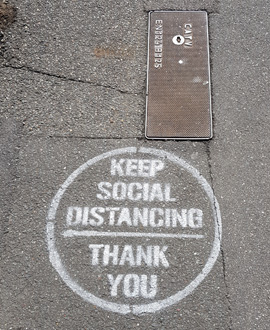The Covid-19 pandemic has resulted in a more volatile and fragmented world as people are more isolated and likely disgruntled with the economic impact on them. Dissatisfaction, plus individual isolation, provides fertile ground and the opportunity for radicalisation in many directions. So a webinar heard, hosted by the business body Resilience First.
Companies have a responsibility to work to combat this by moving upstream from the physical security of their premises to working with their employees to support their mental health and well-being to prevent the kind of alienation that can lead to extremism, the webinar suggested. Companies can also contribute towards wider societal resilience by giving more opportunities to those most impacted by the pandemic, who are often the young who are suffering from a lack of economic opportunity. These were among the findings of the online event to consider how to mitigate the threat of extremism and terrorism in the face of the Covid-19 pandemic.
Robert Hall, Executive Director of Resilience First, said: “The twin threats of extremism and terrorism have become more dispersed and amorphous on the back of the pandemic. The deprivations of lockdown, the opportunity to spend more time online and hook up with fellow conspirators, a growing ultra nationalist dimension and the hate campaigns around BME and religious groups have all added fuel to the fire of both the extremist and the terrorist.”
“Businesses should be prepared to prevent staff from being radicalised as much as to protect others from becoming the innocent casualties. If preparedness is to become a competitive advantage for organisations then we should take a more holistic view of our mitigation measures in order that we become more resilient as individuals and communities.”
Sir Mark Rowley QPM, former Assistant Commissioner for Special Operations at the Metropolitan Police, is a former Head of Counter-Terrorism. He said: “Islamist terror has changed and gone online, propaganda is thrown across the world, scattered like seeds and connected to local grievances in a way that we haven’t seen before. The chance of these seeds hitting fertile ground is growing all the time.
“The right wing has used the online world to go from loners to groups and to connect to global grievances and ideologies. So we have multiple, complex, fragmented threats. These extremist groups have had a captive audience to reach in people’s homes as people have been working from home or have been unemployed.
“Particularly if we look at the last year, grievance has been stoked by Covid-19 and some of the other protest issues around Black Lives Matter and Extinction Rebellion. Such grievances are often exploited by extremists. We have seen increased numbers of fragile states, as states get damaged and distracted by Covid-19, particularly weaker states in Africa and other parts of the world, creating more opportunity for extremists and terrorists.”
Prof Brooke Rogers OBE, Professor of Behavioural Science and Security, King’s College London (KCL), also spoke. She said: “The number of successful Jihadist attacks in Europe has fallen since 2017, with most completed attacks carried out by lone individuals and most foiled attacks planned by groups. By contrast there has been a 320pc increase in far-right terrorist incidents in the last five years.
“There does appear to be a growing movement of far-right terrorism heading our way. An increase in the number of all types of terrorist arrests in recent years indicates increasing numbers of people are considering violence as an acceptable means of bringing about change.
“In the face of the Covid-19 pandemic, we are going to see increased levels of joblessness, with more qualified people sitting at home feeling that their aspirations are being frustrated. We should ask whether we should view the threat of terrorism and extremism in a new light and ask what can and should businesses do to prepare for the evolving threat.”
Matt Maer DSO, Director of Security and Resilience, Canary Wharf Management, said: “Globally the push factors to organised crime, violent extremism and violent protest are many, but they include lack of prospects, economic vulnerability and socio-political marginalisation. The sense of alienation and disgruntlement is going to get a lot worse following Covid-19 with greater unemployment and fewer opportunities.
“Covid-19 has exacerbated a condition of vulnerability to extremism and extremist views with prolonged removal of individuals from their networks and support groups as individuals become less connected with others. To mitigate this, companies need to show interest in their staff and make sure they have access to leaders, mentors and a wider viewpoint.”
“It is the young, including graduates, who are just entering the workplace who are at the tipping point in terms of which way they could go. Take a risk on employing and training the young and give them a chance to join the haves rather than the have nots.”









